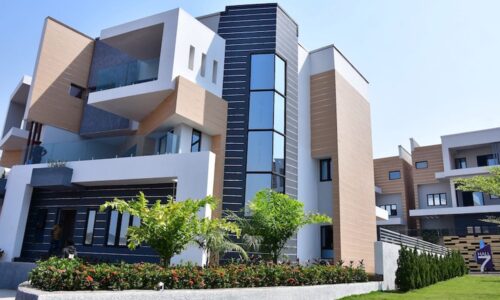- Judith Akatugba
- 0 Comments
- 683 Views
The demand for luxury residential real estate has shifted due to market dynamics, and ultra-high net worth individuals (UHNWIs) are showing increasing interest in investing in this submarket. As a result, developers are experiencing good times.
An increasingly common practice is investing in the dwellings that people occupy, from dorms to residential care facilities for the elderly. This year’s Knight Frank Attitudes Survey indicates that residential real estate investment is becoming a recognized global real estate asset class.
Read Also: Romeo Beckham Rocks Cozy Graphic Sweater Featuring Parents David and Victoria
According to research from BusinessDay, wealthy people are shifting their priorities to spend more money on real estate in order to provide their family a sense of security, well-being, protection, and privacy. As a result, work, socializing, and entertainment are now done in these people’s houses.
This is a result of the COVID-19 epidemic, which altered people’s work, home, and recreational lifestyles significantly.
According to the survey, UHNWIs are getting more interested in investing in purpose-built student accommodation (PBSA), according to 59% of respondents; similarly, 60% of respondents said they are becoming more interested in elder housing and 60% in the private rental sector (PRS).
In a world where interest rates and bond returns are low or negative, investors are searching for assets that generate income, according to James Mannix, head of Residential Investment and Development at Knight Frank.
“This sector offers an investment linked to a demographic rather than an economic cycle, where performance is tied to fundamentals such as education, rising employment, and the ageing population.”
Recent real estate sales in Nigeria have demonstrated an impressive turnout in the luxury sector. Presently, construction projects in Lagos’ Ikoyi area are moving forward in time for their scheduled completion.
A few recently finished luxury developments like Sisi Paris and 4 Bourdillon, which are almost fully occupied, serve as evidence of this. Others in the process have already shown a 50% uptake rate and, when finished, might reach full occupancy.
According to Frank Okosun, senior partner and CEO of Knight Frank Nigeria, the luxury sector has a bright future. He explains, “Developers will need to revive previous designs as large-sized houses become more in demand as remote working becomes the norm.”
Nonetheless, there is a surplus in Nigeria’s high-end luxury real estate market, with an average 40% vacancy rate in upscale areas of Lagos and Abuja. This is mostly because of the ongoing exodus of foreigners from the nation, particularly in the aftermath of the pandemic, and the general reduction in purchasing power.
The nation’s political elites and upper class, however, continue to make demand, which has kept the segment partially functioning. The luxury market is mostly to blame for the high rate of residential vacancy seen in desirable neighborhoods, where supply is still exceeding demand.
Before today, Nigeria had a very favorable business environment that drew foreign investors and expatriates to the nation. These grew to be significant players in the nation’s luxury sector, but recent legislation and the state of the economy have had a negative impact on it.
Money laundering and other economic bottlenecks have been eliminated as a result of stricter government laws. Luxury deals have further slowed down as a result, according to Okosun, as more potential purchasers are being more circumspect.
However, developers have been motivated to rethink luxury projects to align with the current emphasis on smaller units due to the state of the market and amount of demand.
The demand for smaller unit apartments is increasing, according to Obi Nwogugu, principal at African Capital Alliance (ACA), who told BusinessDay that this is because “as investors, we offer what the market demands.”
According to MKO Balogun, CEO of Global PFI, over 60% of individuals wanting to purchase or rent a home in the real estate market right now are opting for smaller units like studio, one-bedroom, and two-bedroom apartments, demonstrating the need for luxury homes with less rooms.
A few of the key factors that will fuel demand for luxury real estate include private outdoor spaces, touchless technology, multiple home offices, and health benefits like air and water purification. This will be especially true for properties with larger footprints and more amenities.
Lower interest rates, low inventory levels, new wealth from pandemic-benefited industries, a millennial population eager to find a safe haven, a notable rise in second-home purchases, upsizing, and new construction with higher wellness standards are all anticipated to contribute to buyer demand.
London, UK, is a fantastic option for investors with patient resources and a hunger for overseas markets, according to James Pullan, head of Student Property at Knight Frank. He points out that although planning concerns have limited new development, more students are still traveling to the capital to pursue their education.
Pullan claims that this is presenting prospects for PBSA investors. He says, “Investment is still coming into the London market, and established assets are in high demand.”











